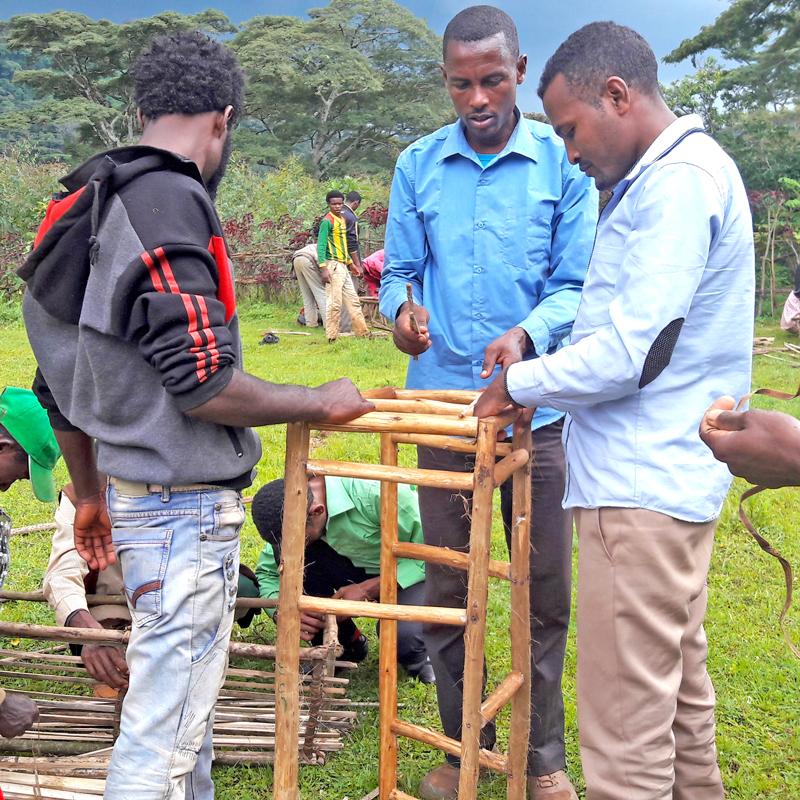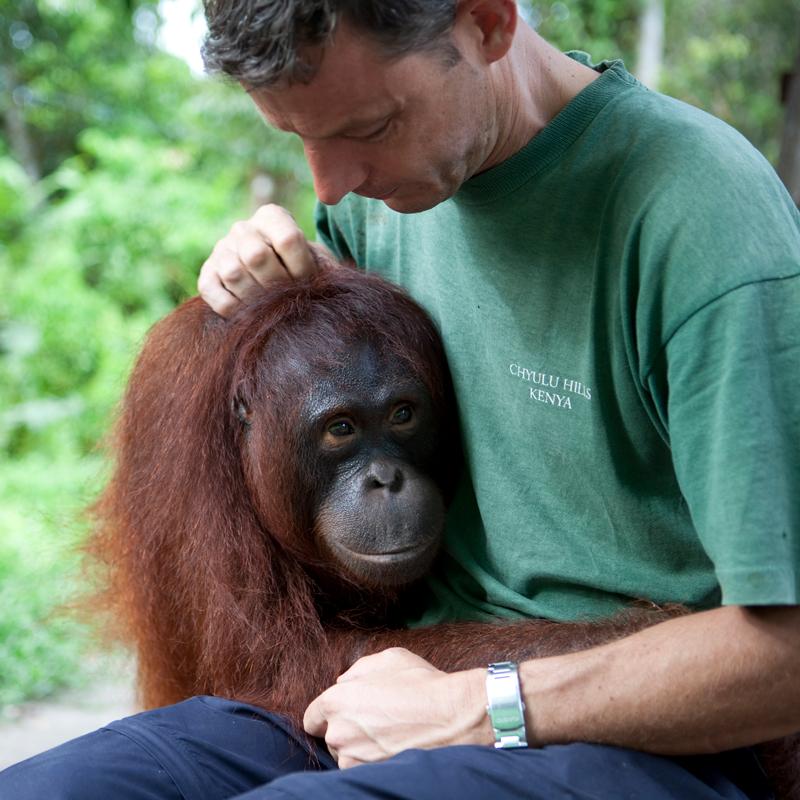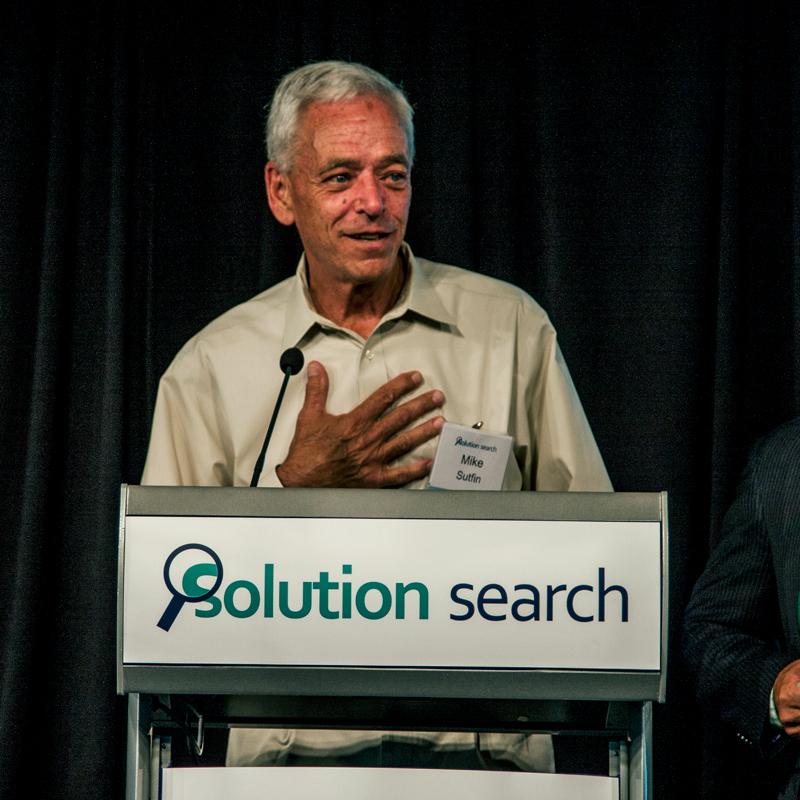Solutions to some of today’s greatest conservation and development challenges exist at the local level, as pockets of innovation in communities around the world. But that’s often where they’ll stay, without ways to reach a global stage and access tools for scale.
Since 2011, Rare has facilitated a global crowdsourcing contest to identify, reward and spotlight promising local solutions. Called Solution Search, the contest has since taken on issues ranging from strengthening coastal fisheries to improving agricultural practices, to mitigating the effects of climate change in forest, wetland and coastal ecosystems.
This month, Solution Search begins its most ambitious search yet, with 2018’s Climate Change Needs Behavior Change. This year, Rare is partnering with Conservation International, The Nature Conservancy, National Geographic, United Nations Development Programme and WWF to search for organizations, communities, companies and governments that are helping reduce consumers’ climate footprint by changing their behavior. There’s rich potential for changing behavior around the things we eat and use, and we can make those changes in different stages of a product’s lifespan — from cultivation to disposal — this year’s contest aims to tap into what’s already working.
Entering Solution Search is the start of a potentially life-changing journey for local practitioners looking to take their solutions to the next level. Participants can benefit from international media recognition, access to global leaders in their field, chances for cash prizes, and extensive networking opportunities that come with the experience. As Climate Change Needs Behavior Change begins its search for a new crop of innovators, we caught up with past participants to learn how the Solution Search experience continued to open up new opportunities for them long after the contest ended.
After 2017’s Farming for Biodiversity, winner Jony Girma of Apis Agribusiness used his Solution Search winnings to overcome financial project hurdles. Following 2015’s Reducing Our Risk contest, winner Mike Sutfin of the City of Ottawa and fellow finalist Dan Rizza of Climate Central stayed in touch after connecting during the contest and work together to advance innovation in their field of disaster risk management. And after 2013’s Adapting to a Changing Environment, Eddy Santoso of Yayorin, a community organization with whom Rare partnered in a 2008 Pride campaign to preserve forests in Borneo’s Central Kalimantan, has learned from fellow 2013 Solution Search entrant Forests Without Borders (Nepal) how to improve local climate impact awareness efforts.
Sustainable honey entrepreneur Jony Girma uses Solution Search prize to make European inroads

Last year, Solution Search held its fourth contest, Farming for Biodiversity, calling for smart, community-powered alternatives to unsustainable farming traditions. When Jony Girma entered his sustainable business model, Apis Agribusiness, into the contest, he had empowered dozens of rural Ethiopian youth to carry out their first harvest of sustainable, organic honey in their community. Opportunities to sell the honey abounded, as buyers in Europe learned of the environmental benefits and story behind the Apis Agribusiness business model. But one thing stood in Girma’s way: money. To afford setting up a honey processing plant and get orders packaged and on their way to European buyers, Girma needed a loan from his local bank. And to secure the loan, he needed collateral.
Girma received the funds he needed when he won the People’s Choice grand prize from Farming for Biodiversity, which came with a $30,000 cash prize. He provided collateral, and his bank agreed to finance his next steps. Before he got to work, he brought his award to Kundi to celebrate with the young beekeepers. “This is not only for me, it is also for them,” he says. “They are the ones who trusted me. When I was explaining my business model, they trusted me, followed me, and joined my system.”
Since Solution Search, Girma has rented a large store, and is arranging a honey processing facility inside the space. He just submitted his business plan to the bank. This month, Apis Agribusiness and its beekeepers will receive their first inspection for organic certification. Girma has applied to certify 250 producers, 50 of them youth and the rest area farmers who have taken up beekeeping with support from Apis Agribusiness. Once his honey is processed and certified, he’ll ship it to buyers in the Netherlands, Norway and South Korea.
The next harvest for Apis Agribusiness’ beekeepers will take place in May and June. “They’re preparing for that,” says Girma. “I’m expecting a quality product, based on my demand. They are ready to supply it to me and they are happy to work with me.”
Girma says the leap of faith in entering a global contest like Solution Search was worth it, especially if you believe in your work. “You have to trust your project,” he says. “You have to be proud of your system, have confidence in it, and go for the application. Ideas may be small for other people, but for the one who is generating the idea, it’s not small. You have to convince others your idea is the best.”
Rare connects local Indonesian NGO with Forests Without Borders Nepal

Since 1991, local Indonesian organization Yayorin has worked to promote conservation and sustainable management of the lowland forests and peat swamps of Borneo’s Central Kalimantan. Led by Eddy Santoso, the group operates out of the city of Pangkalan Bun, working to help communities reduce their environmental and climate impact and adopt sustainable livelihood practices for the benefit of Borneo’s biodiversity.
The Lamandau Wildlife Reserve and its buffer area cover more than 190,000 acres. The reserve is home to an incredible range of species, from crocodiles, to sun bears, to rhinoceros hornbills, to hundreds of wild and rehabilitated orangutans, legendary to the region. In 2008, Yayorin and Eddy Santoso launched a Rare Pride campaign to inspire forest communities to forgo destructive traditions in farming and forest use and embrace practices that allowed nearby ecosystems to thrive. The campaign made the iconic orangutan the focal point, complete with a campaign slogan: “People need the forest. The forest needs orangutans.”
The campaign was a success. According to Santoso, among the 12 villages that Yayorin targeted with its Pride campaign, 77 percent of farmers stopped using slash-and-burn agriculture. After the first campaign concluded, Santoso ran an additional two campaigns using the same Pride methodology and tools. By the end of the second campaign, 96 percent of farmers stopped using slash-and-burn agriculture, and by the end of the third campaign, during which Yayorin focused more heavily on the adoption of sustainable behaviors, 58 percent of farmers were adopting agroforestry.
We learned how to convey to people the benefits of protecting and conserving the natural environment.”Eddy Santoso, Solution Search: Adapting to a Changing Environment winner, Yayorin
“Orangutan in the western area of Kalimantan are safe from threats, especially those who originated in the forest buffer zone of Lamandau Wildlife Reserve,” says Santoso of current conditions. Santoso says that community understanding of the forest, its value, and sustainable practices continue to evolve, as have local efforts in agroforestry. “In the future, we plan to have efforts in developing the fisheries, as well as sugar palm, liberica coffee and vanilla, by using the agroforestry concept,” he says.
In 2013, Yayorin entered the second Solution Search, Adapting to a Changing Environment, which spoke in theme to the group’s long-term goal of helping communities reduce climate impact through change in resource use. After the contest came to an end, another strategic opportunity emerged: connecting with Forests without Borders (Nepal), a likeminded local organization that could help Yayorin apply new insights to its community engagement on climate change.
Rare put the two groups in contact, and Santoso says that Forests without Borders helped Yayorin focus its program on reducing community carbon footprints. In Nepal, Forests without Borders has unique experience using the classroom to raise local environmental awareness. Its programs encourage students and community members to become caretakers of trees, establishing nurseries in schools that are accessible to the whole community. In the process of planting their own trees, the community learns about their importance and reforests once degraded landscapes.
Learning from the group, Yayorin has developed its messaging to help local people discover the benefits of healthy forests, like carbon sequestration. “Our staff interacts with all aspects of the information, listening and developing it as a strategy design that can be adopted into our program, Community Forest Carbon,” says Santoso. “We learned how to convey to people the benefits of protecting and conserving the natural environment. Our work is still developing, while receiving a lot of support. It is important to connect with other organizations like Forests without Borders as a learning experience in managing conservation.”
Two Solution Search finalists team up to boost community flood awareness in the U.S.

The 2015 Solution Search had a U.S. focus. The competition, Reducing Our Risk: Innovation in Disaster Preparation, called for projects that helped American communities proactively manage risk from deadly and costly natural disasters like fires, floods and hurricanes. While the issue is huge, it was a small-town official’s entry that took home the grand prize Judges’ Choice award.
Mike Sutfin, a city official and floodplain manager from Ottawa, Illinois, submitted his city’s open floodplain plan to Solution Search. Sutfin’s submission highlighted the strides made in floodplain management in Ottawa, a city once known as one of Illinois’ worst “repetitive loss communities” and subject to years of annual flood loss.
Ottawa’s open floodplain plan won the grand prize for its innovative and tenacious approach to building flood resilience. The plan involved buying and clearing out over 80 buildings along the Illinois River in the heart of downtown Ottawa to allow the floodplain to resume its natural function. The plan has since stood up to tests from major flooding, including an all-time record flood in 2013. In the face of that flood, Ottawa’s planning left the city’s hospital, schools and wastewater treatment facility relatively unharmed and saved millions in potential financial losses.
After bringing home the grand prize, Sutfin and his team have used the funds to create a program for public information and publish a website for flood awareness, ottawafloods.org. The site provides information about resources the community can use to stay abreast of floods in real time, like inundation maps the National Weather Service and the National Oceanic and Atmospheric Administration added for the City of Ottawa in 2016. Innovation in advanced hydrological prediction services like inundation maps takes flood planning to the next level, says Sutfin. “It’s become one of those kinds of planning tools that we find now — how we ever did without it, we don’t know. Now, as people build, I’m making them go up higher and higher than they’d ever had to go.”
After Solution Search, Sutfin found he also had access to more opportunities to collaborate with others in risk management. Sutfin was appointed, for instance, to the Illinois River Coordinating Council and the federal Community Rating System (CRS) Task Force. “The entire process has been kindled by Solution Search,” says Sutfin. “Everything seemed to kick off after the competition.”
Sutfin’s entry into these groups would prove useful for fellow Solution Search finalist Dan Rizza, Manager and Research Associate for Climate Central’s Program on Sea Level Rise. During 2015’s Reducing Our Risk contest, Rizza submitted Climate Central’s public coastal flooding and sea level rise web tool, the Surging Seas Risk Finder. The tool, updated since the contest, allows users to search for their coastal location and download a range of localized materials, from fact sheets for their city, county, zip code or legislative district, to map images and more.
Participating in Solution Search gives you the opportunity to connect with and get to know people in a wide range of leading organizations and to learn about work across different sectors.”Dan Rizza, Solution Search: Reducing Our Risk: Innovation in Disaster Preparation finalist, Climate Central
When Rizza told Sutfin of his interest in connecting Climate Central’s mapping tool with the work of the Community Rating System (a federal incentive program encouraging community floodplain management activities), Sutfin didn’t hesitate to help. “He has given us useful insight regarding his experience of FEMA’s Community Rating System, which helped inform the development of our Surging Seas CRS Guide,” says Rizza. Sutfin and Rizza have also teamed up to hold calls with Sutfin’s connections at the Illinois Office of Water Resources, to explore future studies related to risk mapping.
Rizza and Sutfin continue to talk and collaborate. “We benefited by the connections we made with Solution Search and have appreciated staying in touch with the other organizations involved,” says Rizza. “Participating in Solution Search gives you the opportunity to connect with and get to know people in a wide range of leading organizations and to learn about work across different sectors.”
• • •
Heading into 2018 with Climate Change Needs Behavior Change, Solution Search will continue to find ways to empower its participants. Contest partners have already taken steps in that direction: following 2017’s Farming for Biodiversity, for instance, Rare and partner IFOAM-Organics International are hosting a 2018 series of capacity-building workshops in eight countries, called Campaigning for Conservation, to empower a select group of the contest’s participants to spread awareness about their solutions and the approaches behind them. As Solution Search brings more practitioners into its community of innovators, we at Rare are excited to see how they can work together and in creative ways bring sustainable development and conservation solutions to scale.